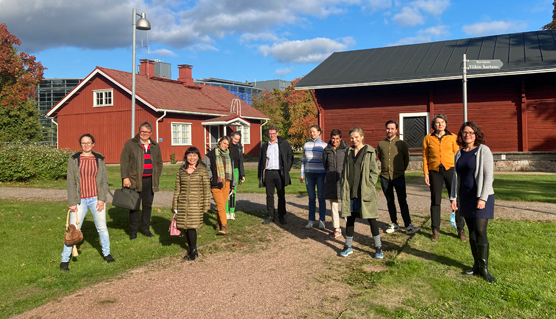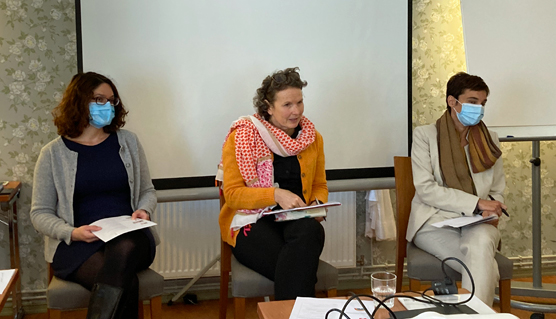
Workshop in Viikki on the 22.9.2021 was a lot of fun, too. © Anni Savikurki
International trade policy and rules may often be regarded as something too vague and difficult to grasp so it is better to leave it on its own. Trade policy is, however, a crucial element which has an influence on food system actors all over the globe. This way it should have the potential to lever food systems’ sustainability as well.
In theory, there exist plenty of trade policy measures ranging from bans, tariffs, taxes, regulation and subsidies to procurement rules and more, but in practice their use is internationally regulated through trade agreements by the World Trade Organization.
However, at times is good to rethink the possible trade measures and re-assess the policy space at hand - what could we possibly do? This was exactly what Just Food researchers Theresa Tribaldos, Elisabeth Bürgi, Irene Musselli and Jimena Solar from the Centre for Development and Environment (CDE) together with Anu Lähteenmäki-Uutela from Finnish Environment Institute (SYKE) wanted to discuss in a workshop on the 22.9.2021 in Viikki, Helsinki.
One of the most enjoyable moment was when participants from universities and research organizations passionately threw themselves into given roles in a play illustrating the varying positions that governments and NGOs might have in trade negotiations. After a quite incisive beginning, the players’ tendency was to find a common ground rethinking their offers while at the same time no giving in on the sustainability issues. That is something that we should wish to happen in real world, too.

Theresa Tribaldos, Elisabeth Bürgi and Irene Musselli as mediators in an amusing role play on trade negotiations. © Anni Savikurki
What could Finland do?
Lively panel discussion at the end of the day concluded the day well. Ellen Huan-Niemi from the Finnish Natural Resource Institute claimed that food is too cheap considering the externality costs to environment, biodiversity and climate which are not reflected in the consumer price. She also reminded about the power that consumers possess in demanding more sustainable products to retail. On the other hand, Markus Schulman from the Ministry for Agriculture and Forestry pondered the extent to which it is possible to set requirements on imported foods to meet the certain sustainability criteria.
Policies have impact but they should work along the same lines. “Policy coherence for sustainable development is the key”, Elina Mikola from The Finnish NGO Umbrella Fingo stated. Juha Ruippo from the Finnish Farmers’ Union emphasized the local solutions while the audience was questioning the reliability of sustainability certification schemes.
Certifications surely are one concrete way of proving sustainability, however the schemes often exclude small-scale producers due to their high costs. Alternatively, more inclusive and bottom-up options have been developed in South America, as Elisabeth Bürgi enlightened the audience with examples from Bolivia.